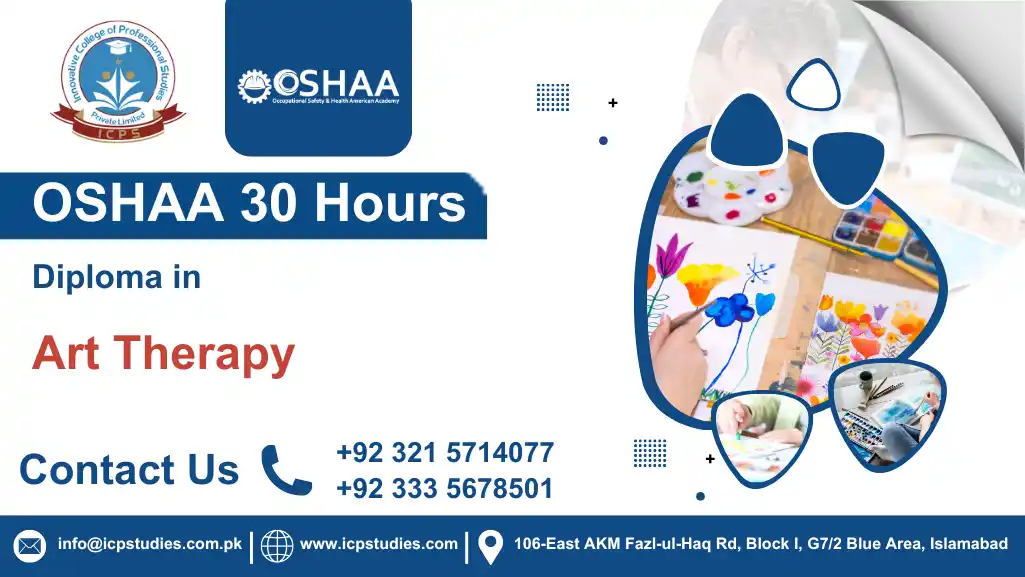The OSHAA 30-Hours Diploma in Art Therapy is an intensive professional training programme designed to explore the therapeutic use of art in mental health, emotional well-being, and personal development. This course bridges the gap between creative expression and psychological understanding, empowering individuals to use art as a healing tool in various professional settings. Art therapy is increasingly recognised in the UK and worldwide as an effective approach to supporting emotional and psychological resilience. The curriculum is structured to support both newcomers to the field and professionals in healthcare, education, and counselling seeking to expand their therapeutic toolkit.
This diploma provides foundational knowledge and practical skills essential for working in art therapy across a variety of contexts, including educational institutions, healthcare settings, community services, and private practice. It combines theoretical insights with experiential learning, enabling participants to understand the psychological impact of creative expression and to facilitate safe, meaningful art therapy sessions. Delivered over 30 hours of guided learning, the course introduces participants to the key principles of art therapy, the role of the therapist, and ethical considerations involved in the practice. Many learners continue on to advanced diploma programmes or university-level degrees in related disciplines.
The OSHAA 30-Hours Diploma in Art Therapy stands out for its balance of theory and practice, accessibility to a wide range of professionals, and alignment with international therapeutic standards. It is ideal for those looking to integrate creative approaches into their work or explore a new career path in art therapy. The flexible structure, expert guidance, and practical focus make it an effective and enriching learning experience. The OSHAA 30-Hours Diploma in Art Therapy is a unique opportunity to engage with the healing potential of creative expression. The OSHAA 30-Hours Diploma in Art Therapy is an excellent choice for anyone interested in integrating the therapeutic benefits of art into their professional practice.
All About OSHAA 30-Hours Diploma in Art Therapy
Course Overview
The OSHAA 30-Hours Diploma in Art Therapy is a professionally designed course that introduces learners to the principles and practices of using art as a therapeutic tool. It provides a strong foundation in understanding how creative expression can support mental health, emotional healing, and personal growth.
This OSHAA 30-Hours Diploma in Art Therapy is ideal for professionals in education, healthcare, counselling, and social care who wish to enhance their skills with creative therapeutic techniques. It also suits individuals seeking a meaningful career path in art therapy or emotional support services.
The OSHAA 30-Hours Diploma in Art Therapy covers essential topics such as emotional expression through art, group facilitation, ethics in therapy, and cultural sensitivity. Practical activities and reflective learning ensure that participants gain hands-on experience in a supportive learning environment.
With international recognition and alignment to UK professional standards, the OSHAA 30-Hours Diploma in Art Therapy offers valuable career progression. Graduates can apply their skills in schools, hospitals, community centres, or pursue further studies in art psychotherapy and mental health.
Study Units
- Introduction to Art Therapy
- Theories and Approaches in Art Therapy
- Assessment in Art Therapy
- The Therapeutic Relationship in Art Therapy
- Creative Techniques in Art Therapy
- Working with Children in Art Therapy
- Art Therapy for Trauma and Grief
- Ethical and Professional Considerations in Art Therapy
To ensure all participants are able to fully engage with the course content and benefit from the learning experience, the following entry requirements must be met:
- Minimum Age: Applicants must be at least 18 years old at the time of enrolment.
- Educational Background: A minimum of a high school certificate or equivalent is preferred. However, individuals with a genuine interest in art, psychology, or mental health are encouraged to apply, even if they do not hold formal qualifications.
- Work Experience: While prior professional experience is not mandatory, a background in education, healthcare, social services, or the creative arts may enhance understanding and application of course material.
- Language Proficiency: A good command of English is required, as the course is delivered entirely in English. Participants should be able to read, write, and communicate clearly in both written and spoken English.
This course is designed for individuals who have a passion for helping others through creative and therapeutic methods. It is ideal for professionals and aspiring practitioners who wish to incorporate art-based approaches into their work or explore a new career path in emotional support and mental well-being.
The diploma is particularly suited for:
- Teachers, educators, and school support staff aiming to promote emotional well-being among students
- Healthcare professionals, nurses, and care workers interested in holistic support techniques
- Counsellors, psychologists, and social workers looking to expand their therapeutic tools
- Artists, creatives, and individuals with a passion for using art in meaningful, healing ways
- Anyone seeking personal development or exploring a future in art therapy or mental health services
No advanced qualifications are required, making this course accessible to both experienced professionals and motivated beginners.
Learning Outcomes
Introduction to Art Therapy
- Understand the fundamental concepts and purpose of art therapy
- Explore the historical development and scope of the field
- Identify the benefits and limitations of art therapy in various settings
Theories and Approaches in Art Therapy
- Recognise major psychological theories that inform art therapy practices
- Compare different therapeutic approaches such as psychodynamic, humanistic, and cognitive-behavioural
- Apply appropriate theoretical models to client needs and session goals
Assessment in Art Therapy
- Understand the principles of assessment in a therapeutic context
- Learn how to observe and interpret visual expressions meaningfully
- Develop basic skills in planning and documenting therapy goals and progress
The Therapeutic Relationship in Art Therapy
- Explore the importance of building trust and safety within sessions
- Understand therapist-client dynamics and boundaries
- Learn how to maintain a supportive and non-judgmental environment
Creative Techniques in Art Therapy
- Experiment with various artistic media and tools for emotional expression
- Learn how to select appropriate techniques for different client needs
- Understand how to guide clients through creative processes safely and effectively
Working with Children in Art Therapy
- Gain insights into developmental stages and emotional needs of children
- Learn child-friendly therapeutic techniques and communication styles
- Understand safeguarding considerations and how to work collaboratively with families
Art Therapy for Trauma and Grief
- Understand trauma-informed practices and the emotional impact of grief
- Learn to use art safely to help clients process difficult experiences
- Explore strategies for managing emotional responses during sessions
Ethical and Professional Considerations in Art Therapy
- Recognise ethical issues including confidentiality, consent, and boundaries
- Understand professional responsibilities and codes of conduct
- Learn how to maintain reflective practice and ongoing professional development
FAQs OSHAA 30-Hours Diploma in Art Therapy







